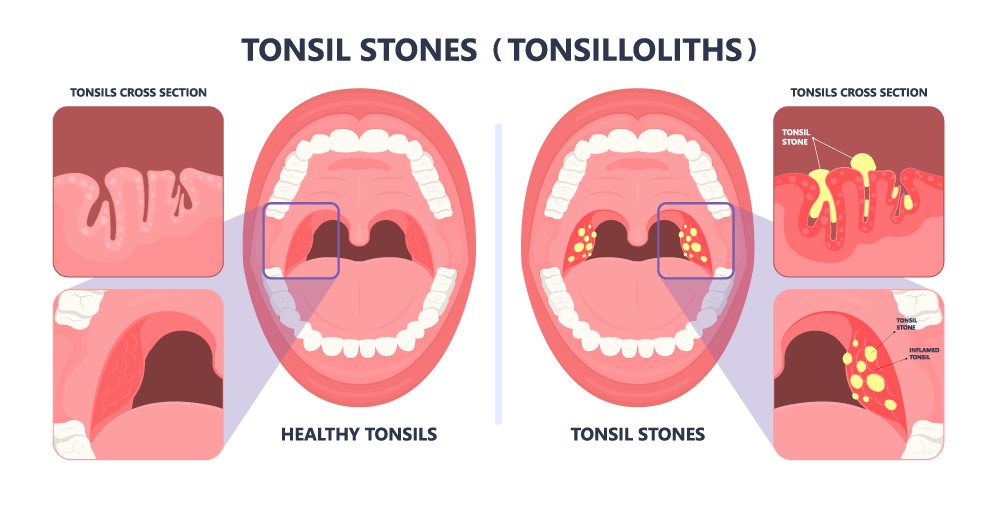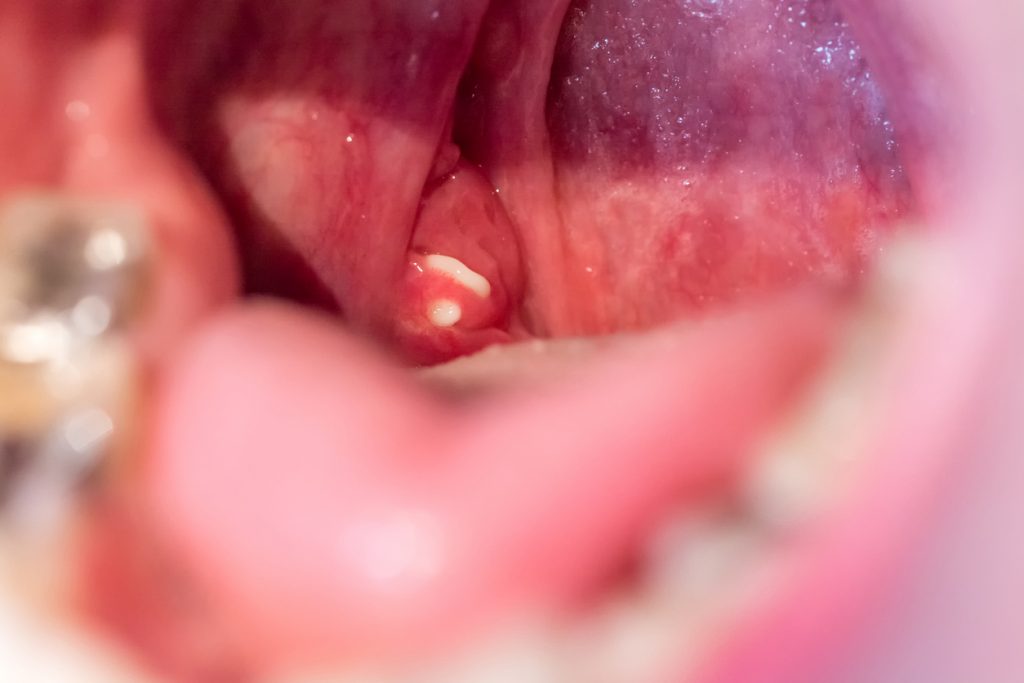Maybe you’ve heard of kidney stones or even gall stones, but what about tonsil stones? We know our tonsils can act up and become inflamed with tonsillitis, but did you know that one in every ten people develops tonsil stones?
What are tonsil stones?
To understand tonsil stones, you’ll want to understand the structure of your tonsils, where these stones form and grow. The tonsils are located at each side of the back of the throat. These two oval-shaped pads of tissue are usually about the same size and have the same pink color as the surrounding area.
Our tonsils are part of the lymphatic system and filter out bacteria and trap germs that attempt to enter your body through the mouth and nose. By preventing and fighting infections, your tonsils defend your immune system and play an essential role in your overall health.
Tonsils can be as problematic as they are helpful. Some people elect to undergo a tonsillectomy (surgical removal of the tonsils) because they experience recurrent tonsillitis (inflammation of the tonsils). Some choose to do so because they have been diagnosed with sleep-disordered breathing. Others find that their tonsils are prone to the development of tonsil stones.
What causes tonsil stones?
By design, tonsils feature folds, gaps, and crevices called tonsillar crypts. When dead cells, mucus, minerals, food particles, or bacteria accumulate inside these crevices, a soft clump of debris forms. Over time, the debris hardens to create tonsilloliths, more commonly called tonsil stones.
Most tonsil stones are tiny (about the size of a grain of rice), but a tonsil stone can grow as large as a grape. Yellow or white in color, tonsil stones are relatively common, but they rarely cause serious health problems.

Tonsil stones are common among people who are repeatedly diagnosed with tonsillitis. Tonsillitis develops due to a viral or bacterial infection. Symptoms include swollen or tender lymph nodes, difficulty swallowing, and a sore throat.
People with large tonsils are also susceptible to developing tonsil stones. It’s important to note that tonsil stones do not indicate poor oral hygiene. However, maintaining good oral hygiene habits such as brushing, flossing, and using mouthwash can prevent tonsil stones by removing bacteria and food particles. Overall, it seems that the more tonsillar crypts you have, the more likely you are to develop tonsil stones.
What are the symptoms of tonsil stones?
A majority of tonsil stones are painless and cause limited symptoms. It’s possible to be unaware that you even have tonsil stones. If symptoms do arise, two of the most notable ones are bad breath and the sensation that you have something stuck in the back of your throat.
People with large, well-established tonsil stones may experience chronic sore throats, swelling/inflammation, or difficulty swallowing. In some cases, tonsil stones can even cause ear pain due to shared nerve pathways.
How are tonsil stones treated or removed?

Your tonsils and surrounding tissue in the back of the throat are delicate. Please use caution if you attempt to remove your tonsil stones with any at-home method.
One of the easiest ways to expel a tonsil stone is to take a deep breath and cough. If this simple yet effective solution doesn’t work, there are other ways to loosen and dislodge the stones.
Some people find that a saltwater or apple cider vinegar gargle can help break down even the most stubborn tonsil stones. Others find using a water flosser (Waterpik®) with the water pressure on the low setting can do the job. Another option is to use a clean cotton swab to gently push the stone outward into the mouth so it can be spit out.
Be warned that when you successfully remove the stone, you’ll likely notice a distinct and foul odor.
Suppose you prefer to leave tonsil stone removal to a specialist. In that case, Oakdale Ear, Nose & Throat Clinic can diagnose tonsil stones and safely dislodge them. Give us a call at 763-233-5755 to speak with one of our schedulers, or request an appointment online.
Patients who regularly develop large tonsil stones, have painful stones, or experience repeated infections, may wish to discuss having a tonsillectomy. This is the only way to permanently remove and completely prevent tonsil stones.
A final note about tonsil stones
As much of a nuisance as tonsil stones may be, many people find it reassuring to know that they are generally harmless.
